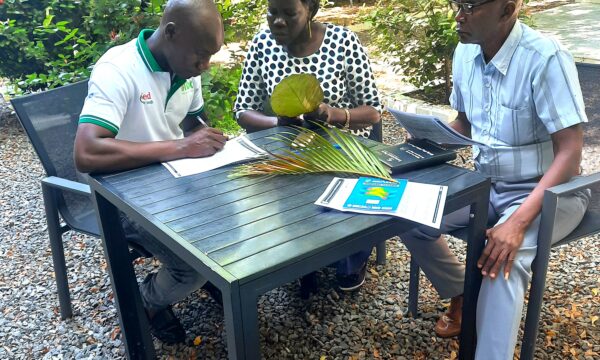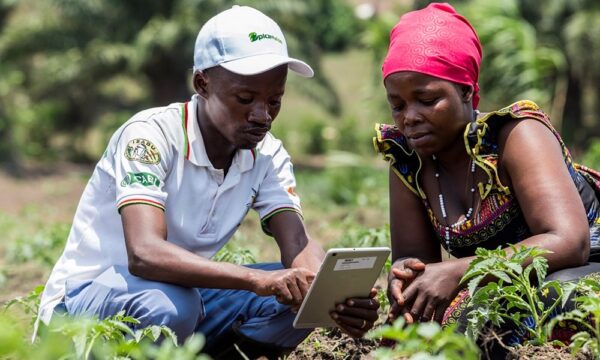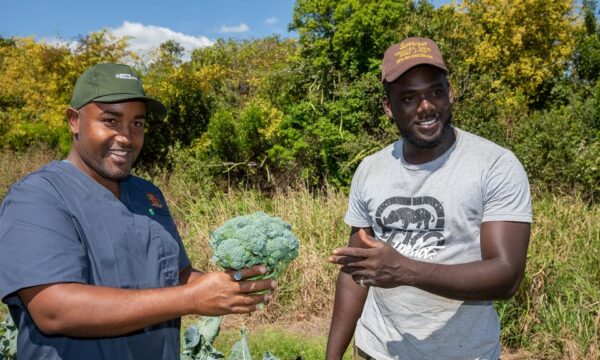
Kanyumbu village is a compact rural farming village in Lilongwe district in Malawi. Farmers in this village mostly produce maize, beans, and mangoes from a few trees scattered in their fields. In 2013, they received a new service from the Department of Agriculture; a plant clinic, with a plant doctor. They were informed that they could present any crop affected by pests and diseases, or that was simply ‘not looking normal’. The plant doctor could examine the crop samples, diagnose the problem and tell them what was ailing their crops. On the spot, the plant doctor could provide advice on how to manage the crop pests and problems.

Farmers presenting their affected crop samples at a plant clinic
At first, the farmers were skeptical about this “plant clinic”. They were not sure how things would be different with this person they called a “plant doctor”! However, on the scheduled plant clinic day, farmers from the village came and presented crop samples to the plant clinic. The plant doctor examined the individual crop samples, cutting some up using a knife, and using a magnifying lens to have a closer look at the symptoms. She turned the crop samples over to one side, and another side, while looking closely at each of them with her magnifying lens. The plant doctor also asked each farmer a few questions to establish the history of the problem. She then explained in detail her diagnosis for each and every farmer. After that, she wrote a ‘prescription’ on a sheet of paper and and explained that these were instructions on how to manage the problem once the farmers got back home. The plant doctor also made sure to fully explain the safety measures farmers needed to observe when applying pesticides, such as wearing protective gear to cover the head, nose, neck, body, legs and feet. The plant doctor also advised that pesticides should be applied early in the morning or late in the evening when the sun had set.
Mr Frank Jekita is the headman for Kanyumbu village and says that farmers are happy with the services of plant clinics. Before the plant clinic came to their area, Mr Jekita reported that whenever they faced a problem of pest or disease on their crops, they would rush to an agro-dealer to buy a product based on their description of the problem to the person behind the counter. More often than not, the pesticides did not work and it the problem persisted. Further, Mr Jekita said that before he visited a plant clinic, he once applied a pesticide bought from an agro-dealer and after application, he experienced serious side effects; he got a skin rash on his hands, his skin was itchy, he was sweating profusely and had a serious headache.

Farmers listen to a plant doctor during a plant clinic session
Now, with the plant doctor’s advice, farmers properly observe the pesticide application safety measures and are no longer afraid to use them because of possible harmful side effects. Farmers now buy the pesticides that are recommended for their crops by the plant doctor and these pesticides work. Mr Jekita concludes that because of the advice from the plant doctor “our crops have answers”.
Since the first clinic in 2013, there are now 110 active plant clinics in Malawi with 250 trained plant doctors giving advice across the country. An on-farm study carried out by Plantwise in Malawi showed that in 2017 tomato farmers who used plant clinics saw a 20% increase in yield and 21% increase on household income.
Visit the Malawi page on the Plantwise Knowledge Bank to learn more→
Related News & Blogs
Plant clinics showcased at Harvest Money Expo in Uganda to help empower the country’s young smallholder farmers
The CABI-led PlantwisePlus programme showcased its plant clinics at the Harvest Money Expo in Uganda to help empower the country’s young smallholder farmers to grow more and lose less to potentially devastating crop pests and diseases. The Harvest Mone…
22 March 2024




